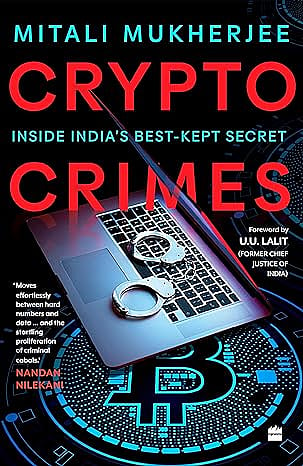Fast Money

Central banks print money. Commercial banks charge you to transact it.
The first can create runaway inflation if unchecked—ask the Argentinians. On penal cost, ask a migrant worker in Europe sending money home to Africa.
Bitcoin was designed to be non-inflationary, and was coded to put a cap on the number of coins. It also promised low transaction costs. A third feature, anonymity, promised the ability to transact outside the law, and in its early days, Bitcoin was closely associated with Silk Road, a channel used to transact banned drugs. But the US government caught up with its founder, Ross Ulbricht, sentenced him to 40 years, and seized Bitcoin now worth billions of dollars.
The battle for technical supremacy between cops and robbers is eternal, and in Crypto Crimes, Mitali Mukherjee carefully traces the evolving lines of control over bitcoin and other crypto currencies. It seems the Indian cops are winning. At one stage, for example, there was a rash of kidnapping for crypto ransom. But, only 0.4 per cent of Indian kidnappings ask for crypto.
“Kidnappers in India face the challenge of how to ‘cash out’ their cryptocurrency ransom.” The reason is clear—if you believe crime pays, then you want to be paid in a currency which you can easily transact. But you can’t buy a pizza in bitcoin, and any substantial movements into and out of crypto currency are reported to the Financial Intelligence Unit (FIU) of the Government of India. Similarly, a red flag goes up when a chunk of crypto currency moves from one exchange to another, or to a privately held wallet. Indian crypto exchanges are subject to way more compliance than our banks.
Openomics 2026: Continuity and Conviction
06 Feb 2026 - Vol 04 | Issue 57
The performance state at its peak
The essential construct of crypto is a distributed ledger, which means that the data of transactions is available on computers across the world. Though the number of entries is staggering, they are indelible, and the taxman now knows how to find his way through the digital thickets. Our own hawala system, in contrast, takes place within a tight network of trust, with no formal records.
“All politicians are using Bitcoin to hide their black money”, Mukherjee quotes Vikram Thakral, founder of BuyUCoin.
“Crypto or hawala?” I asked a source who has studied the flow of illicit funds into and out of India. There’s no contest—he was categorical. Politicians move money in massive tranches: a hundred crores is common. The hawala operators do that for 2 to 3 per cent, while the premium on the dollar on Indian crypto exchanges is over 5 per cent. Add to that the traceability and the difficulty of ‘on-ramping’ cash onto a crypto exchange. Mukherjee quotes her own source, “for political money, cash is still king.”
The currency we use is a monopoly of the nation-state. The same state apparatus has a monopoly over violence, and writes the books which decide what invokes the penal tools at its command. Crypto will only be allowed to function to the extent that it does not threaten government money.
At the same time, regulators, past and present, are aware that many features of crypto are the future of currency. Subhash Garg, ex Finance Secretary, stresses the need to talk about a decentralised economy, about blockchain technology. Instead, bureaucrats are too busy “talking about regulation of the crypto exchanges”.
Bureaucrats regulate the past, while entrepreneurs and geeks speculate the future into existence. Crypto began as a Wild West dream of a parallel monetary universe that challenged borders and central bankers. That is a faded dream, but the technology is powerful and continues to attract the maverick minds of millions of geniuses.
Crime will always exist, and whether it seeks payment in crypto or used hundred-dollar bills is only an instrumentality. Crypto can write many scripts, and the scenarios it unfolds will be determined by the quality of regulation we bring to bear on it. The lens of crypto crime must not dominate.

